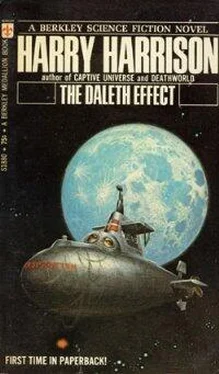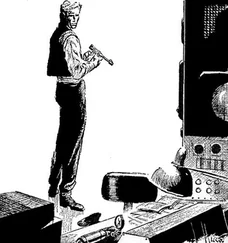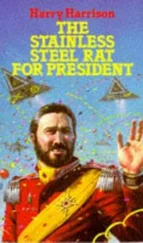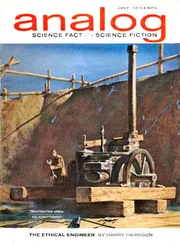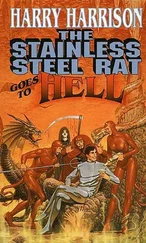They could have moved under their own power, but it had been decided that the tugs should warp them free of the harbor first. No one knew what kind* of handling characteristics this unorthodox ship would have, so the engines would not be started until they were in the unobstructed waters of the Sound. After a brief exchange of sharp, fussy blasts on their whistles, the tugs got under way. As they moved slowly down the harbor, following the torpedo boat that had weighed anchor and preceded them, they had their first clear sight of the area beyond.
“Some secret launching,” Henning said, pointing at the crowds that lined the seawall. They were cheering, waving their arms, and the bright patches of Danish flags were to be seen everywhere.
“Everyone in town knew that something was up here. Once we were launched you couldn’t stop them from turning out.”
The tugs swung a long arc and headed for the harbor entrance. The mole and seawall on either side were black with people, and still more running toward the entrance. As the ship slipped through they waved and shouted, many of them with coats over pajamas, wearing a motley array of fur hats, raincoats, anoraks, anything that could be thrown on quickly. Nils resisted a strong impulse to wave back. Then they were through, away from the lights, into the waters of the Oresund: the first waves broke over the low decks, washing around the boots of the crewmen who tended the lines there.
Well clear of the shore the tugs cast off, tooted farewell, and turned about.
“Cast off,” Henning said. “Decks cleared and hatches secured.”
“You may proceed then,” Nils said.
There were a separate set of controls at the second pilot’s position, used only for surface navigation. Two great electric motors were mounted on pods secured to the hull of the ship. Only electric cables penetrated the pressure hull, assuring an airtight continuity. Each motor drove a large six-bladed propeller. There was no rudder; steering was controlled by varying the relative speed of the propellers, which could even be run in opposite directions for sharp turning. Throttles and steering were all controlled from the single position on the bridge, accurate and smooth control being assured by the computer, which monitored the entire operation.
Henning eased forward both throttles and Galathea came to life. No longer shorebound, no longer at tow, she was a vessel in her own right. Waves broke against the bow, streamed down the sides, then splashed onto the deck as their speed increased. The lights of Helsingor began to fall behind them. A dash of spray hit the port.
“What’s our speed?” Nils asked.
“A stupendous six knots. Our hull has all the fine seagoing characteristics of a gravy boat.”
“This will be her first and last ocean cruise, so relax.” He made a quick calculation. “Slacken off to five knots, that will get us to the harbor at dawn.”
“Aye aye, sir.”
Their maiden voyage was going more smoothly than anyone had expected. There was some water seepage around one of the hatches, but this was caused by an incorrectly sized gasket and they could fit one of the spares as soon as they docked. In the semidarkness of the bridge Nils crossed his fingers: it should only stay this way.
“Do you want some coffee, Captain?” Henning asked. “I had some made and put in thermos bottles before we shut the kitchen down.”
“A good idea—send for it.”
A tall seaman, sporting sidewhiskers and a great moustache, brought it a few minutes later, stamping in in his heavy sea boots and saluting broadly.
“Who the devil are you?” Nils asked. He had never seen the man before.
“He’s one of the extra deckhands you asked me to get,” Henning answered. “They had to be found and cleared, three of them, and they just came aboard this afternoon. Things were pretty busy at the time. Jens here has been trying to volunteer for this assignment for months. He says he has experience with the Daleth drive.”
“You what?”
“Yes sir, Captain. I helped weld up the first experimental one. Nearly broke the back of our ship, it did. Captain Hougaard is still trying to find someone to sue.”
“Well—glad to have you aboard, Jens,” Nils said, feeling self-conscious about the nautical terms, though no one else seemed to notice.
Their slow voyage continued. It was less than thirty kilometers by sea from Helsingor to Copenhagen, and it was taking them longer than the million-kilometer voyage to the Moon. They had no choice. Until the Daleth drive was installed, they were nothing more than an underpowered electric tub.
The eastern horizon was gold-barred with dawn when they came to the entrance to the Free Port of Copenhagen. Two tugs, riding the easy swell, were waiting for them. They tied up and, in a reverse of their leavetaking, were eased gently into the Frihavn, to the waiting slip at the Vestbassin.
“That’s good timing,” Nils said, pointing to the convoy just pulling up on the wharf. “They must have been tracking us all the time. Skou told me he had almost a full division of soldiers deployed here. Lining the streets every foot of the way from the Institute. I wish it were all over.” He clenched and unclenched his fists, the only sign of tension.
“You and I both. Nothing can go wrong. Too many precautions, but still…”
“Still, all of our eggs are in one basket. There is the drive.” He pointed to the plastic-wrapped bulk already being eased from the flatbed truck by the dockside crane. “And the professors will be right there with it. All in one basket. But don’t worry, it looks like the entire Danish army is out there. Nothing short of an atom bomb could do anything here today.”
“And what is to stop that?” Henning’s face was white, strained. “There aire a lot of them in this world, aren’t there? What is to stop someone who can’t get the drive from arranging it so no one can get it? Balance of power—”
“Shut up. You have too much imagination.” Nils meant to say it kindly, but there was an unexpected harsh edge to his words. They both looked up, starting slightly as a flight of jets, bright in the rising sun, screeched by close overhead.
“Ours,” Nils said, smiling.
“I wish they would hurry,” Henning answered, refusing to be cheered up.
It would take precision work to get the giant Daleth drive swung aboard and mounted, so despite all the advance preparations it seemed to be maddeningly slow. Even as Gdlathea was being securely moored to the dock, the large hatch on the stern deck was being unbolted and opened; a large crane bent its steel neck over, ready to lift when it was free. The hatch would be used once only, then welded shut. The great steel plate moved up, turning slowly, and was pulled back to the shore. The moment it was free the other crane was swinging out the tubular bull of the Daleth drive. Carefully, with measured movements. it vanished through the hatchway.
The phone rang and Nils answered it, listening and nodding. “Right. Take him to my cabin, I’ll see him there.” He hung up and ignored Henning’s lifted eyebrows. “Take over, I won’t be long.”
An officer in the uniform of Livgarden, the Royal Life Guards, was waiting when he came. The man saluted and held out a thick cream envelope that had been sealed with red wax. Nils recognized the cypher that had been pressed into the wax.
“I’m to wait for an answer,” the officer said. Nils nodded and tore the envelope open. He read the brief message, then went to his desk. In a holder there was some official ship’s stationery, unused until now, that some efficient supply officer had had printed. He took a sheet—this was a fitting first message—and wrote a quick note. He sealed it into an envelope and handed it to the officer.
Читать дальше
